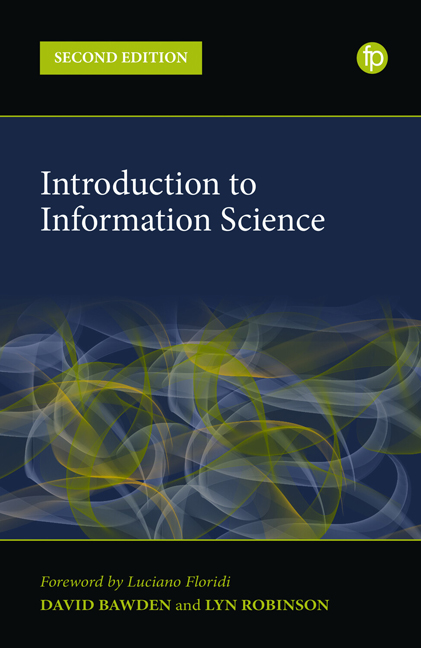Book contents
- Frontmatter
- Contents
- Figures
- Preface
- Foreword – Curators of Semantic Capital
- List of Acronyms
- 1 The Information Science Discipline
- 2 History of Information: the Story of Documents
- 3 Philosophies of Information
- 4 Paradigms, Turns and Theories in the Information Sciences
- 5 Information
- 6 Documents and Documentation
- 7 Domain Analysis
- 8 Information Organisation
- 9 Digital Technologies and Data Systems
- 10 Information Systems
- 11 Informetrics
- 12 Information Behaviour
- 13 Communicating Information: Changing Contexts
- 14 Information Management and Policy
- 15 Information Law and Ethics
- 16 Information Society
- 17 Digital (Onlife) Literacies
- 18 Research in the Information Sciences
- 19 The Future of the Information Sciences
- Additional Resources
- Index
18 - Research in the Information Sciences
Published online by Cambridge University Press: 21 April 2022
- Frontmatter
- Contents
- Figures
- Preface
- Foreword – Curators of Semantic Capital
- List of Acronyms
- 1 The Information Science Discipline
- 2 History of Information: the Story of Documents
- 3 Philosophies of Information
- 4 Paradigms, Turns and Theories in the Information Sciences
- 5 Information
- 6 Documents and Documentation
- 7 Domain Analysis
- 8 Information Organisation
- 9 Digital Technologies and Data Systems
- 10 Information Systems
- 11 Informetrics
- 12 Information Behaviour
- 13 Communicating Information: Changing Contexts
- 14 Information Management and Policy
- 15 Information Law and Ethics
- 16 Information Society
- 17 Digital (Onlife) Literacies
- 18 Research in the Information Sciences
- 19 The Future of the Information Sciences
- Additional Resources
- Index
Summary
Can it be that there are no problems in library service that call for scientific research? Nothing more to learn? No unsolved problems? Is it to be classed with – what shall I say? – the activities of the street-car conductor, the waiter, the clerk?
Charles Williamson (address delivered at the Founder's Day Exercises, School of Library Science, Western Reserve University, 10 June 1930)Research is to see what everybody else has seen, and to think what nobody else has thought.
Albert Szent-Györgi, Hungarian biochemistResearch is formalized curiosity. Poking and prying with a purpose.
Zora Neale Hurston, American novelist and anthropologistIntroduction
Research is generally regarded as the creation of new knowledge; more specifically, as the creation of knowledge which is new to everyone, not just to the researcher, in a form which can be communicated through objective information, and which builds on existing knowledge. Communication to the wider community is the vital final stage of research, through the processes of scholarly communication and further dissemination discussed in Chapter 13.
Research is often described in terms of major discoveries by brilliant individuals. But it is usually more realistic to think of it as the creation of new knowledge within a discipline by an evolutionary and impersonal process, with contributions by many individuals, most of whom will never be credited with a major advance (Scerri, 2016).
For a discipline with an associated professional activity, such as information science, research has two purposes: academic, to improve the discipline's knowledge base; and professional, to improve practice. Information research may be carried out by university researchers, advanced students, research institutes and consultancies, government agencies, system and service designers and suppliers and practitioners. Research has been an important aspect of information science since the discipline's beginnings.
In this chapter we will consider first the somewhat troubled research/practice interaction, then consider information research and methods and finally mention research ethics. There are several textbooks for this area, and the coverage here will not be detailed.
Research and the practitioner
Interaction between academics and researchers on the one hand, and practitioners on the other, is as desirable in the information disciplines as in any other academic area with an associated professional discipline.
- Type
- Chapter
- Information
- Introduction to Information Science , pp. 351 - 370Publisher: FacetPrint publication year: 2022



